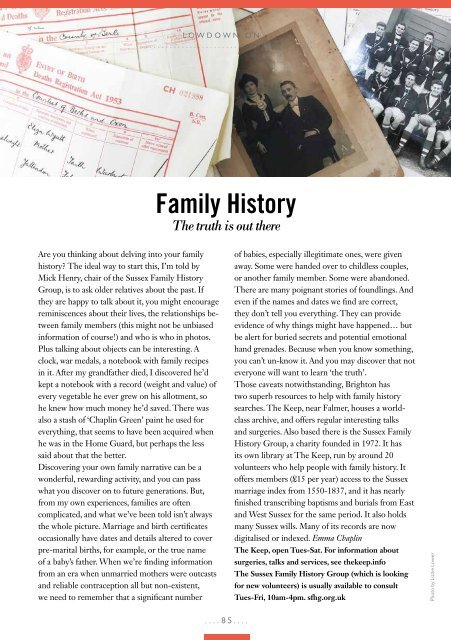Viva Brighton Issue #58 December 2017
You also want an ePaper? Increase the reach of your titles
YUMPU automatically turns print PDFs into web optimized ePapers that Google loves.
LOWDOWN ON...<br />
...........................................<br />
Family History<br />
The truth is out there<br />
Are you thinking about delving into your family<br />
history? The ideal way to start this, I’m told by<br />
Mick Henry, chair of the Sussex Family History<br />
Group, is to ask older relatives about the past. If<br />
they are happy to talk about it, you might encourage<br />
reminiscences about their lives, the relationships between<br />
family members (this might not be unbiased<br />
information of course!) and who is who in photos.<br />
Plus talking about objects can be interesting. A<br />
clock, war medals, a notebook with family recipes<br />
in it. After my grandfather died, I discovered he’d<br />
kept a notebook with a record (weight and value) of<br />
every vegetable he ever grew on his allotment, so<br />
he knew how much money he’d saved. There was<br />
also a stash of ‘Chaplin Green’ paint he used for<br />
everything, that seems to have been acquired when<br />
he was in the Home Guard, but perhaps the less<br />
said about that the better.<br />
Discovering your own family narrative can be a<br />
wonderful, rewarding activity, and you can pass<br />
what you discover on to future generations. But,<br />
from my own experiences, families are often<br />
complicated, and what we’ve been told isn’t always<br />
the whole picture. Marriage and birth certificates<br />
occasionally have dates and details altered to cover<br />
pre-marital births, for example, or the true name<br />
of a baby’s father. When we’re finding information<br />
from an era when unmarried mothers were outcasts<br />
and reliable contraception all but non-existent,<br />
we need to remember that a significant number<br />
of babies, especially illegitimate ones, were given<br />
away. Some were handed over to childless couples,<br />
or another family member. Some were abandoned.<br />
There are many poignant stories of foundlings. And<br />
even if the names and dates we find are correct,<br />
they don’t tell you everything. They can provide<br />
evidence of why things might have happened… but<br />
be alert for buried secrets and potential emotional<br />
hand grenades. Because when you know something,<br />
you can’t un-know it. And you may discover that not<br />
everyone will want to learn ‘the truth’.<br />
Those caveats notwithstanding, <strong>Brighton</strong> has<br />
two superb resources to help with family history<br />
searches. The Keep, near Falmer, houses a worldclass<br />
archive, and offers regular interesting talks<br />
and surgeries. Also based there is the Sussex Family<br />
History Group, a charity founded in 1972. It has<br />
its own library at The Keep, run by around 20<br />
volunteers who help people with family history. It<br />
offers members (£15 per year) access to the Sussex<br />
marriage index from 1550-1837, and it has nearly<br />
finished transcribing baptisms and burials from East<br />
and West Sussex for the same period. It also holds<br />
many Sussex wills. Many of its records are now<br />
digitalised or indexed. Emma Chaplin<br />
The Keep, open Tues-Sat. For information about<br />
surgeries, talks and services, see thekeep.info<br />
The Sussex Family History Group (which is looking<br />
for new volunteers) is usually available to consult<br />
Tues-Fri, 10am-4pm. sfhg.org.uk<br />
Photo by Lizzie Lower<br />
....85....


















